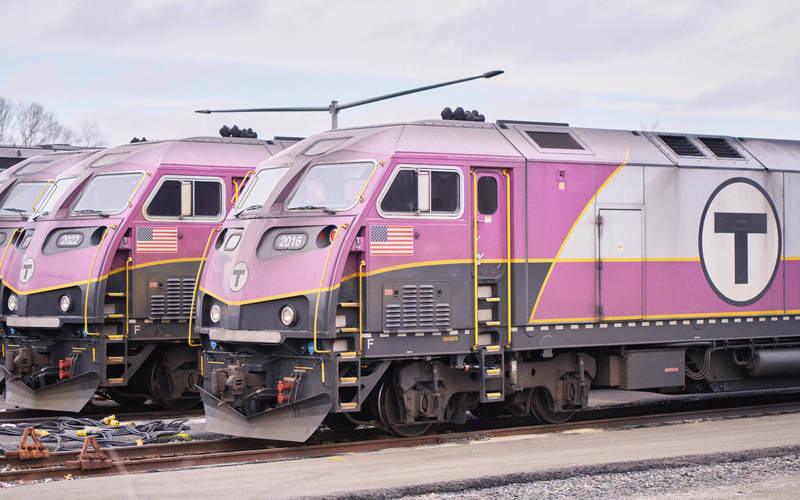
Massachusetts' residents deserve access to fast and reliable public transit that doesn't harm their health and environment. Photo: Jarvis Chen.
The Problem: Massachusetts’ Commuter Rail Runs On Dirty Fossil Fuels
Currently, Massachusetts’ commuter rail trains run on diesel, a dirty fossil fuel that pollutes our air, harms our health, and contributes to climate change.
But the diesel fumes coming from these trains don’t impact everyone equally. Low-income communities and residents of color bear the brunt of this pollution. Boston’s Fairmount Line, for example, runs through predominately Black and Brown neighborhoods, often directly by people’s backyards. That’s one of many reasons why the State designated the entirety of the Fairmount Corridor an environmental justice community. Residents here face higher rates of asthma and other health conditions than most of the state.
Powering commuter rail trains with electricity offers a viable solution to the pollution they currently generate. In addition to being much cleaner, trains powered by electric batteries or overhead wires also run much more efficiently. That could mean faster and more frequent service.
CLF in Action: Fighting for Cleaner Transit
For decades, CLF has advocated for cleaner, faster, and more equitable public transit for all Commonwealth residents. We have made significant strides in that direction.
In partnership with the Fairmount Indigo Transit Coalition, CLF fought for the opening of new stations, increased service, and reduced fares along the line. Yet, transportation remains the largest source of toxic pollution in Massachusetts. To achieve a fairer transit system, we need to phase out harmful emissions for good. CLF is exploring every angle to push for the electrification of the commuter rail system.
Progress: Commuter Rail Electrification Ahead
In March of 2024, the MBTA announced plans to start electrified service on the Fairmount Line by 2028. This change resulted from the advocacy of thousands of concerned riders who raised their voices alongside CLF and our partners, demanding a better transit system.
While the electrification of the Fairmount Line is an exciting win, we need to hold the MBTA accountable. CLF is keeping an eye on the agency to ensure its plans for fully electrifying the commuter rail system move ahead as quickly as possible. Residents living along the line have watched their health suffer while coping with slow and unreliable service. They can’t wait any longer for change.
And we need to electrify the rest of the commuter rail system, too. Faster and more frequent service is key to making public transit a more attractive option for commuters. That’s a critical step to reducing the number of cars on the road and decreasing emissions even further.
Next Steps: Cleaner Public Transit for All
We’re pushing our elected officials to go the full distance. CLF and our partners have tirelessly advocated for the passage of a bill that would require the electrification of the entire commuter rail system by 2035. The bill moved favorably through the Transportation Committee and is now before the Senate Ways & Means Committee.
The proposed legislation would also:
- Set deadlines to ensure timely progress of electrification projects
- Prioritize electrification in environmental justice communities – like the Fairmount Indigo Corridor
- Ensure more frequent and reliable service to make public transit a more convenient option
You can help, too. Contact your representative and ask them to support this bill and a cleaner, faster, better transit system for all. Together, we can build a sustainable and equitable transit future for Massachusetts.



